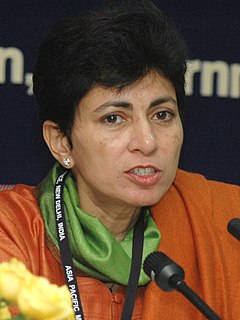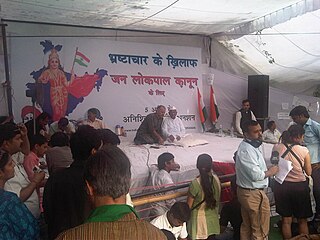
The Rajya Sabha, constitutionally the Council of States, is the upper house of the bicameral Parliament of India. As of 2021 it has a maximum membership of 245, of which 233 are elected by the legislatures of the states and union territories using single transferable votes through open ballots, while the president can appoint 12 members for their contributions to art, literature, science, and social services. The potential seating capacity of the Rajya Sabha is 245, according to article 80 of the Indian Constitution. Members sit for staggered terms lasting six years, with about a third of the 238 designates up for election every two years, in even-numbered years. The Rajya Sabha meets in continuous sessions, and unlike the Lok Sabha, being the lower house of the Parliament, the Rajya Sabha is not subjected to dissolution. However, the Rajya Sabha, like the Lok Sabha, can be prorogued by the president.
India has a parliamentary system as defined by its constitution, with power distributed between the central government and the states.

A hawker is a vendor of merchandise that can be easily transported; the term is roughly synonymous with costermonger or peddler. In most places where the term is used, a hawker sells inexpensive goods, handicrafts, or food items. Whether stationary or mobile, hawkers often advertise by loud street cries or chants, and conduct banter with customers, to attract attention and enhance sales.
The Convent of Jesus and Mary, Delhi, India, or CJM, is a girls day school in Delhi, India. Established in 1919, it is one of a network of Convents of Jesus and Mary in India and the UK.

Selja Kumari is an Indian politician and former parliamentarian. A member of the Indian National Congress, she has been the Minister of Social Justice and Empowerment and Tourism in the Government of India during Manmohan Singh's premiership.

Bijoy Krishna Handique was an Indian politician who was a member of the 15th Lok Sabha of India. He represented the Jorhat constituency of Assam and was a member of the Indian National Congress (INC) political party. He was the only son of Krishna Kanta Handique, a renowned Indologist. Handique was a senior Member of Parliament from the North Eastern Region and represented the Jorhat Lok Sabha, Assam for six consecutive terms since 1991 to 2009. He also served as a Rajya Sabha member from 1980 to 1986. He had been elected to the Assam State Assembly in 1972 from the Jorhat constituency.
The Ministry of Housing and Urban Poverty Alleviation was a ministry of the Government of India responsible for urban poverty, housing, and employment programs. It involved in national policy decisions and coordinates with Indian central ministries, state governments, and central sponsor programs. The Ministry was created in 2004 after splitting it from the Ministry of Urban Development.

Surendrajeet Singh Ahluwalia is an Indian politician of the Bharatiya Janata Party (BJP), and a senior Member of Parliament in his 32nd year as a Parliamentarian.

Babul Supriyo is an Indian playback singer, live performer, television host, actor and politician who currently serves as Cabinet Minister of Information Technology and Electronics and Tourism of the Government of West Bengal. He was elected Member of Parliament from Asansol in the 16th and 17th Lok Sabha and also served as the Minister of State for Environment, Forest and Climate Change, in the Union Council of Ministers. He officially resigned as MP on 19 October 2021. and was elected as a Member of the West Bengal Legislative Assembly on 16 April 2022 from Ballygunge Assembly seat.

Pon Radhakrishnan is an Indian politician from Tamil Nadu, representing the Bharatiya Janata Party. He was the Minister of State in the Ministry of Finance and Ministry of Shipping between May 2014 and May 2019. Earlier, he served in the Union Minister of State for Road Transport & Highways in the NDA government. He has served as the minister of state for Youth affairs and Minister of State in the Ministry of Housing and Urban Poverty Alleviation in Third Vajpayee Ministry. He is elected to Lok Sabha from Kanyakumari in Tamil Nadu in 2014. He lost in the recent 2019 parliamentary elections.
Ashok Tanwar is an Indian politician, former President of Haryana Pradesh Congress Committee, Member of Parliament from Sirsa and Secretary, All India Congress Committee. He was also a former president of Indian Youth Congress and NSUI. He was the youngest person to become the president of Indian Youth Congress.

The Indian anti-corruption movement, popularly known as Anna Andolan, was a series of demonstrations and protests across India that began in 2011 and was intended to establish strong legislation and enforcement against perceived endemic political corruption. The movement was named as one of the "Top 10 News Stories of 2011" by Time magazine.
Whistle Blowers Protection Act, 2011 is an Act of the Parliament of India which provides a mechanism to investigate alleged corruption and misuse of power by public servants and also protect anyone who exposes alleged wrongdoing in government bodies, projects and offices. The wrongdoing might take the form of fraud, corruption or mismanagement. The Act will also ensure punishment for false or frivolous complaints.

Galla Jayadev, also known as Jay Galla, is an Indian politician and industrialist in India. He is the managing director of Amara Raja Group and TDP Parliamentary Party Leader. Jayadev is a member of 16th and 17th Lok Sabha of India representing from Guntur Lok Sabha constituency and a member of Telugu Desam Party.

The Lokpal and Lokayuktas Act, 2013, commonly known as The Lokpal Act, is an anti-corruption Act of Indian Parliament in India which "seeks to provide for the establishment of the institution of Lokpal to inquire into allegations of corruption against certain important public functionaries including the Prime Minister, cabinet ministers, members of parliament, Group A officials of the Central Government and for matters connecting them".

Ajay Maken is a politician from the Indian National Congress party. He is the general secretary of the All India Congress Committee (AICC) and member of the Congress Working Committee (CWC). He was formerly a minister in the Indian Cabinet of Prime Minister Dr. Manmohan Singh and a minister in the Cabinet of Delhi Chief Minister Sheila Dikshit.

Juvenile Justice Act, 2015 has been passed by Parliament of India amidst intense controversy, debate and protest on many of its provisions by Child Rights fraternity. It replaced the Indian juvenile delinquency law, Juvenile Justice Act, 2000, and allows for juveniles in conflict with Law in the age group of 16–18, involved in Heinous Offences, to be tried as adults. The Act also sought to create a universally accessible adoption law for India, overtaking the Hindu Adoptions and Maintenance Act (1956) and the Guardians and Wards Act (1890), though not replacing them. The Act came into force from 15 January 2016.
The Real Estate Act, 2016 is an Act of the Parliament of India which seeks to protect home-buyers as well as help boost investments in the real estate industry. The Act establishes a Real Estate Regulatory Authority (RERA) in each state for regulation of the real estate sector and also acts as an adjudicating body for speedy dispute resolution. The bill was passed by the Rajya Sabha on 10 March 2016 and by the Lok Sabha on 15 March 2016. The Act came into force on 1 May 2016 with 61 of 92 sections notified. The remaining provisions came into force on 1 May 2017. The Central and state governments are liable to notify the Rules under the Act within a statutory period of six months.
Chaudhary Dalbir Singh (1926-1987) was an Indian politician and cabinet minister.
The Transgender Persons Act, 2019 is an act of the Parliament of India with the objective to provide for protection of rights of transgender people, their welfare, and other related matters. The act was introduced in the Lok Sabha, the lower house of the Parliament, on 19 July 2019 by the Minister of Social Justice and Empowerment, Thawar Chand Gehlot, in light of the lapse of the Transgender Persons Bill, 2018. The 2019 act and the immediately preceding 2018 bill, were both preceded by a 2016 version. They were met with protests and criticism by some transgender people, lawyers, and activists in India. The 2016 bill was sent to a standing committee which submitted its report in July 2017. Following this, the Lok Sabha tabled and passed a newer version of the bill in December 2018. However, it did not incorporate many of the committee's recommendations. Although members of the opposition criticised the 2019 act and assured activists that they would not vote in favour of it, it was passed by the Lok Sabha on 5 August 2019 and by the Rajya Sabha, the upper house of the Parliament, on 26 November 2019. The president assented to it on 5 December 2019, upon which the act was published in the Gazette of India. It has been in effect since 10 January 2020 following a notification of the same in the Gazette on the same day.













